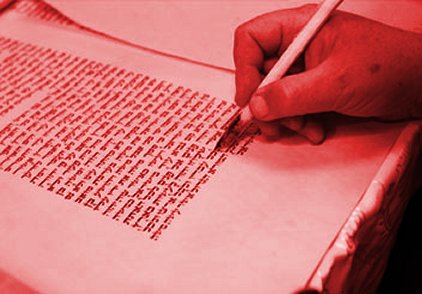
The Masoretes were the post-crucifixion heirs to the 'Scribes' or Torah-teachers mentioned in the Messianic Scriptures (New Testament). Messiah did not mince His words because of the religious hypocrisy of the vast majority of them who murderously conspired against the emet (truth) of the Besorah (Gospel) whilst enslaving their own people to their own man-made traditions:
"Woe to you, scribes and Pharisees, hypocrites! For you shut up the kingdom of heaven against men; for you neither go in yourselves, nor do you allow those who are entering to go in. Woe to you, scribes and Pharisees, hypocrites! For you devour widows' houses, and for a pretense make long prayers. Therefore you will receive greater condemnation. Woe to you, scribes and Pharisees, hypocrites! For you travel land and sea to win one proselyte, and when he is won, you make him twice as much a son of hell as yourselves. Woe to you, blind guides, who say, 'Whoever swears by the temple, it is nothing; but whoever swears by the gold of the temple, he is obliged to perform it.' 'Fools and blind! For which is greater, the gold or the temple that sanctifies the gold? And, 'Whoever swears by the altar, it is nothing; but whoever swears by the gift that is on it, he is obliged to perform it.' 'Fools and blind! For which is greater, the gift or the altar that sanctifies the gift? Therefore he who swears by the altar, swears by it and by all things on it. He who swears by the temple, swears by it and by Him who dwells in it. And he who swears by heaven, swears by the throne of Elohim (God) and by Him who sits on it. Woe to you, scribes and Pharisees, hypocrites! For you pay tithe of mint and anise and cummin, and have neglected the weightier matters of the Torah (Law): justice and mercy and emunah (faith). These you ought to have done, without leaving the others undone. Blind guides, who strain out a gnat and swallow a camel! Woe to you, scribes and Pharisees, hypocrites! For you cleanse the outside of the cup and dish, but inside they are full of extortion and self-indulgence. Blind Pharisee, first cleanse the inside of the cup and dish, that the outside of them may be clean also. Woe to you, scribes and Pharisees, hypocrites! For you are like whitewashed tombs which indeed appear beautiful outwardly, but inside are full of dead men's bones and all uncleanness. Even so you also outwardly appear righteous to men, but inside you are full of hypocrisy and torahlessness (lawlessness). Woe to you, scribes and Pharisees, hypocrites! Because you build the tombs of the nevi'im (prophets) and adorn the monuments of the righteous, and say, 'If we had lived in the days of our fathers, we would not have been partakers with them in the blood of the nevi'im (prophets).' Therefore you are witnesses against yourselves that you are sons of those who murdered the nevi'im (prophets). Fill up, then, the measure of your fathers' guilt. Serpents, brood of vipers! How can you escape the condemnation of hell?" (Matt.23:13-33, NKJV).
Yah'shua (Jesus) went on to say:
"Therefore, indeed, I send you [true] nevi'im (prophets), wise men, and Torah-teachers (scribes): some of them you will kill and crucify, and some of them you will scourge in your synagogues and persecute from city to city, that on you may come all the righteous blood shed on the earth, from the blood of righteous Abel to the blood of Zechariah, son of Berechiah, whom you murdered between the temple and the altar. Assuredly, I say to you, all these things will come upon this generation" (Matt.23:34-36, NKJV).
From the middle of the 2nd century BC, Hebrew was no longer generally spoken (being replaced by Aramaic) and its cessation as a living language led in time to difficulty over pronunciation of the biblical text, since the vocalic consonants failed to represent all the variations of sound. In order to safeguard the pronunciation of the consonantal text, 'authoritatively' fixed about the end of the 1st century AD (the same time that the last of the New Testament books were being composed), a vowel system was devised and elaborated by the Masortes (from the Hebrew masorah meaning, 'tradition'). As the heirs of the Scribes they were thus engaged from about the 5th century AD, the Tiberian system superceding those of Babylon and Palestine in the Masoretic text which became definitive. This vowel system is known as 'pointing' (nikked) and consists of a series of strokes and dots below or above the appropriate consonants. For even greater precision accents were added, which are of importance especially as marks of punctuation and of the tone.
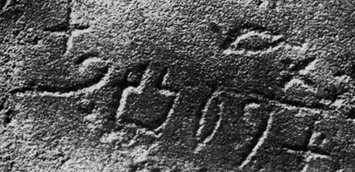 The earliest Hebrew script (time of Moses) was hieroglyphic
The earliest Hebrew script (time of Moses) was hieroglyphic
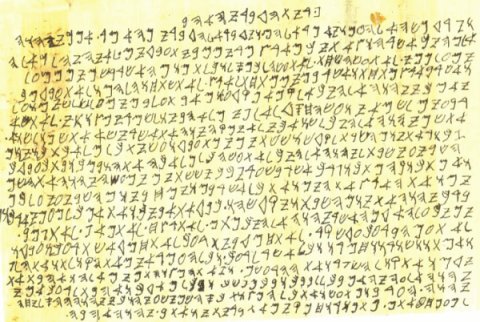 Pre-block, pre-Masoretic Paleo-Hebrew (unpointed) script
Pre-block, pre-Masoretic Paleo-Hebrew (unpointed) script
The Masoretic Text is written with an alphabet (called 'block script' because of the shape of most of the characters) which was borrowed from Assyria (Persia) around the 6th-7th century B.C. (see below), and is almost 1000 years newer than the form of writing used by Moses, David, and most of the Tanakh (Old Testament) authors.
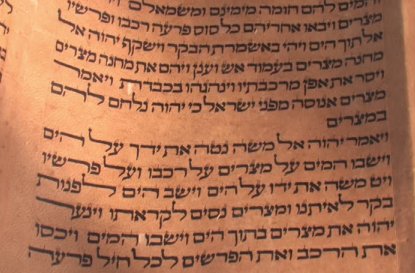 Pre-Masoretic unpointed block text based on old Assyrian
Pre-Masoretic unpointed block text based on old Assyrian
For thousands of years, ancient Hebrew was only written with consonants, no vowels. When reading these texts, they had to supply all of the vowels from memory, based on oral tradition. This is not as difficult to do as it first might seem to those of us acquainted with written vowels. Thus it would not take most very long to recognise the modern English sentence, TH CT ST N TH MT ('the cat sat on the mat'). Adding the wrong vowels could, in a longer and more sophisticated sentence, radically change the meaning, but even shorter, simpler sentences like this one can take on a slightly different meaning - 'the cat sat on the mut'. Instead of sitting on a mat, it could be sitting on a dog, mongrel or unintelligent person. Though context usually reveals the correct meaning, sometimes there can be ambiguity.
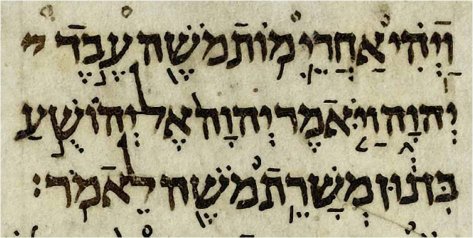 Masoretic pointed (vowels added) block text common today
Masoretic pointed (vowels added) block text common today
The addition of the pointing and accents of the Masorete Scribes resulted in a rigid uniformity that eliminated variations of dialect and changes in pronunciation that took place in the Hebrew language throughout the thousand or so years of its use in biblical times. The Masoretes succeeded in almost completely effacing any such differences as well as inserting their own interpretation of the text by means of their own pointing.
The Masoretes also changed some of the consonants and created entirely new words, one of the most common changes being the divine name YHWH (Yahweh -  ) which they replaced with the Greek loan word (from the pagan god Adonis), 'Adonai', meaning 'Lord' or 'Master'. ) which they replaced with the Greek loan word (from the pagan god Adonis), 'Adonai', meaning 'Lord' or 'Master'.
It is in large part because of this deliberate and unwarranted substitution that the Heavenly Father is no longer called by His correct Name, "Yahweh" but is simply referred to as "LORD", itself of pagan origin traceable to a Roman house deity and even earlier to the Etruscan Larth, the name of a long dead king who became deified (turned into a god):
"Do not invoke (call upon) the names of other elohim (gods); do not let them be heard on your lips" (Ex.23:13, NIV).
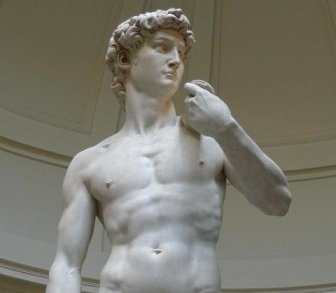 The Greek god Adonis and origin of 'Adonai' or 'LORD'
The Greek god Adonis and origin of 'Adonai' or 'LORD'
This action on the part of the Masoretes is also a wicked transgression of the third commandment (which forbids believers from either falsifying or rendering the Creator's Name null and void - Ex.20:7) and of the mitzvah (commandment) not to add, remove or change the Davar Elohim (Word of God) (Dt.4:2; 12:32: Prov.30:6; cp. Rev.22:18-19). Well it could be said of the Masoretes, as of the false nevi'im (prophets) and scribes before them:
"...you have perverted the devarim (words) of the living Elohim (God), Yahweh-Tseva'ot (Yahweh of hosts/armies), our Elohim (God)" (Jer.23:36, NKJV).
Worse still, the same Masoretes combined the consonants of the Tetragrammaton (YHWH -  ) with the vowels of 'Adonai' and created the bastard word 'YEHOVAH' which became the more familar 'JEHOVAH', which literally translates 'Jah is perverse', a blasphemy if ever there was one. The corrupted name of the Creator first appeared in Scripture in the 1530 English Bible as 'Iehovah' and from there passed on into the King James Version of 1611 and into most English translations. ) with the vowels of 'Adonai' and created the bastard word 'YEHOVAH' which became the more familar 'JEHOVAH', which literally translates 'Jah is perverse', a blasphemy if ever there was one. The corrupted name of the Creator first appeared in Scripture in the 1530 English Bible as 'Iehovah' and from there passed on into the King James Version of 1611 and into most English translations.
On the Continent Martin Luther ensured that the same corruption appeared in his 1534 German version, in the Spanish Valera version of 1602, the Portugese Almeida version of 1681, down to the German Eberfelder version of 1871, and the American Standard Version of 1901. It appears that the Catholic Jerusalem Bible (JB) of 1966 was the first one to used Yahweh instead of 'LORD' and 'Jehovah' (before the first Messianic versions) though under pressure from the Jews the later New Jerusalem Bible reverted back to the old error.
Most of the work of the Masoretes was done between ca. 600 - 950 AD during the first millennnium of the Christian/Messianic era, something which must be born in mind given the historical rivalry between Christianity and Judaism to be the claimant to represent the one true Faith.
If we are to be strictly accurate, the Masoretic Text is not so much a Tanakh (Old Testament) as a COMMENTARY on the Tanakh (Old Testament), one of the earliest paraphrases of the original. Adam Clarke, an 18th Century Protestant scholar, demonstrates that the vowel-point system is more than a help to correctly pronounce the Hebrew and Aramaic but actually a running commentary which was incorporated into the text itself. In the General Preface of his biblical commentary published in 1810, he writes:
"The Masoretes were the most extensive Jewish commentators which that nation could ever boast. The system of punctuation, probably invented by them, is a continual gloss on the Law and the Prophets; their vowel points, and prosaic and metrical accents, &c., give every word to which they are affixed a peculiar kind of meaning, which in their simple state, multitudes of them can by no means bear. The vowel points alone add whole conjugations to the language. This system is one of the most artificial, particular, and extensive comments ever written on the Word of God; for there is not one word in the Bible that is not the subject of a particular gloss through its influence."
Another early scholar who investigated this matter was Louis Cappel, who wrote during the early 17th century. An article in the 1948 edition of the Encyclopedia Britannica includes the following information regarding his research of the Masoretic Text:
"As a Hebrew scholar, he concluded that the vowel points and accents were not an original part of Hebrew, but were inserted by the Masorete Jews of Tiberias, not earlier than the 5th Century AD, and that the primitive Hebrew characters are Aramaic and were substituted for the more ancient at the time of the captivity ... The various readings in the Old Testament Text and the differences between the ancient versions and the Masoretic Text convinced him that the integrity of the Hebrew text as held by Protestants, was untenable."
There is more. It would be a mistake to conclude, as many ignorantly suppose, that there was, and is, even 'a' or 'the' Masoretic Tanakh (Old Testament) text. There was no more a singular Masoretic Text than there was a single 'Received', 'Majority' or 'Byzantine' text (the 'Textus Receptus') of the Messianic Scriptures New Testament. There were three major groups of Masoretes:
- 1. The Palestinian;
- 2. The Babylonian; and
- 3. The Tiberian.
The standard Hebrew text of both Jewish Tanakh's and Christian/Messianic Bibles is that of the 'Tiberian school' which gained prominence over the other two. So when the 'Masoretic Text' is today spoken of, it is strictly speaking the 'Tiberian Masoretic Text'. The Tiberian Masoretes themselves differed with each other on minor matters, and texts produced by the Ben Asher family came to be revered as the best of the Tiberian tradition. The last of this family was Aaron ben Asher, and his work is incorporated into two widely used Masoretic manuscripts (MSS):
- 1. The Aleppo Codex or (A) which is the basis of the Hebrew University Bible Project (HUBP); and
- 2. The Leningrad Codex or (L), the base text for the Biblia Hebraica Stuttgartensia (BHS).
Tiberian MSS generally contain four components:
- a. The consonantal text;
- b. The vowel signs;
- c. The accents; and
- d. The Masoretic notes written in the margins.
It is therefore more accurate to refer to representatives of the Masoretic Text, such as the text of the A or L. The text of the Second Rabbinic Bible, edited by Jacob ben Chayyim (1524-25) was for centuries considered the authoritative version of the Hebrew Bible and was thus frequently labeled the 'Masoretic Text'. Modern scholarship, however, has shown that the Second Rabbinic Bible was based on relatively late manuscripts, and thus probably not the representative of the 'Masoretic Text'. Most modern editions of the Hebrew Bible print some form of this Tiberian 'Masoretic Text', but Biblia Hebraica Stuttgartensia (BHS) (based on L) is currently the standard scholarly edition of the 'Masoretic Text' in the West.
In Messianic Bible 'translations', revisions of the pre-translated Jewish Publication Society's 1917 text is the foundation of the Tanakh (Old Testament) portions of David Stern's Complete Jewish Bible (CJB) and James Trimm's Hebraic-Roots Version (HRV). Moshe Koniuchowsky's Tanakh (Old Testament) Restoration Scriptures True Name Edition (RSTNE) is little more than a reverse translation and revision of the King James Version (KJV) and the remainder (like the ISRV, Halleluyah Scriptures and OJB) are, in most cases, no more than cosmetic revisions of undisclosed pre-existing translations. And the only decent Messianic New Testaments of any serious scholarly value are the AENT (Roth) and HRV (Trimm). Otherwise existing messianic translations tend to follow the Masoretic glosses.
The discovery of the Dead Sea Scrolls at Qumran (DSS) in 1947, containing the oldest samples of the Tanakh (Old Testament) hitherto known, has rocked the scholarly world and many denominations. By contrast, the Masoretic Aleppo Codex dates from 920 AD and the Leningrad Codex from 1008 AD, a thousand years into the Christian/Messianic era! Only Greek translations of the Tanakh (Old Testament) were known to be older than these two Masoretic works making the DSS find of monumental importance. The Qumran cache contained all the books of the Tanakh (Old Testament) except the Book of Esther, believed by this ministry to be a later Pharisaic forgery (see materials on Purim and Origin of the Canon: 1. The Tanakh (Old Testament)). The Isaiah scrolls from Qumran are known to date between 150 BC and 70 AD, making them a millennium (1,000 years) older (and therefore closer to the original autographs) than the Masoretic text with its evident anti-Christian biases.
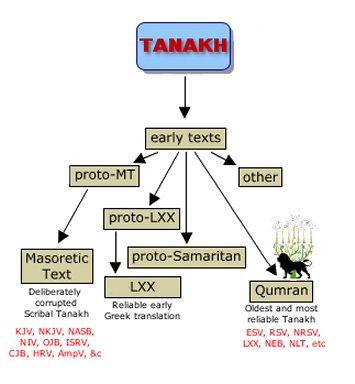
80 years later since their discovery, a large number of the DSS have still not been published, deliberately suppressed by the French Catholic institution that controls them that has led, in turn, to a number of needless and harmful sensationalist conspiracy theories by anti-Christian atheist or gnostic scholars (like Robert Eisenman & Elaine Pagels, respectively) and highly biased and fanciful best-selling atheistic journalists (like Michael Baigent & Richard Leigh). We are still awaiting the full publication of the Qumran finds.
Suspicions about the unreliability of the Masoretic Received (Accepted) Text or Textus Receptus (not to be confused with the New Testament Textus Receptus) came much earlier than the textual discoveries made in the 1947 find of the DSS. The rediscovery of the Samaritan Hebrew Pentateuch (Genesis-Deuteronomy) by Pietro della Valle in 1616 opened a whole can of worms that pointed to deliberate Masoretic mutilation of the Tanakh. The Samaritan text was made available to scholars shortly afterwards when Morinus first printed it in 1632 alongside other versions in the Paris Polyglot. Over 6,000 deviations from the Masoretic were soon found and it was further established that about one third of these variae lectiones could be traced also in the Septuagint (LXX). This concurrance enhanced the growing doubts which had been raised as to the accuracy and reliability of the Masoretic text and led to the inevitable conclusion that a revision had been made by the rabbis after the destruction of the Temple in the first half the 2nd century AD which could not, therefore, represent the ipisissima verba (lit. 'the very words') of the divinely inspired message, and so was a faulty text, resulting from incuria librariorum or from willful malicious tampering with it on the part of the Jewish rabbis and of their exclusion of variant MSS which they did not like, particularly those which agreed with the LXX (because of their loathing of all things Greek) or which possessed strong Christological pointers.
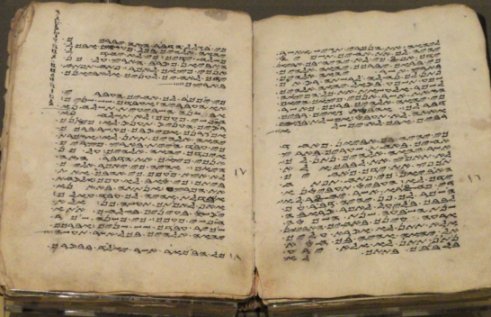 The Samaritan Pentateuch
The Samaritan Pentateuch
What, then, do we need to be aware of when it comes to our Masoretic-based Tanak's or Old Testaments?
- 1. The Masoretes admitted that they received corrupted texts to begin with;
- 2. The Masoretic Text is written with a radically different alphabet (block script) than the original (glyphs);
- 3. The Masoretes added vowel points and accents which did not exist in the original which created an inbuilt interpretation and commentary;
- 4. The Masoretic Text excluded several books from the Tanakh (Old Testament) scriptures (like Sirach, Widsom of Solomon and Tobit) and added one of their own invention (Esther); and (most critically)
- 5. The Masoretic Text included changes to prophecy and doctrine.
Early rabbinic sources, from around 200 AD, mention several passages of Scripture in which the conclusion is inevitable that the ancient reading must have differed from that of the present text. Rabbi Simon ben Pazzi (3rd century) called these readings "emendations of the Scribes" or tikkune Soferim (Midrash Genesis Rabbah xlix 7), assuming that the Scribes actually made the changes. This view was adopted by the later Midrash and by the majority of Masoretes. So the Masoretes themselves knew, and admitted, that they were working from corrupted materials. This can not be good news for Westerners reading Bibles whose Old Testament portions are passed on from the Masoretic text! Even assuming a perfect translation were ever to be made of the Masoretic material it would still be corrupt.
What, then, can be trusted? And how shall be arrive at an as-accurate-as-possible Tanakh (Old Testament). Certainly not by taking any short-cuts but only by doing lots of hard work as serious translators continue to do. This is why we cannot rely on a single Protestant or Messianic version like the KJV or HRV. We have to dig and we have to search. On the Protestant side, good work has been done by the ESV and NRSV which are not afraid to stray from the Mesoretic Text and look seriously at the Dead Sea Scrolls (DSS) and Septuagint (LXX). In the 2nd century AD, centuries before the time of the Masoretes, Justin Martyr investigated a number of Tanakh (Old Testament) texts in various Jewish synagogues and ultimately concluded that the Jews who had rejected Messiah had also rejected the Septuagint (LXX), and were now tampering with the Hebrew Scriptures themselves:
"But I am far from putting reliance in your teachers, who refuse to admit that the interpretation made by the seventy elders who were with Ptolemy [king] of the Egyptians is a correct one; and they attempt to frame another. And I wish you to observe, that they have altogether taken away many Scriptures from the [Septuagint] translations effected by those seventy elders who were with Ptolemy, and by which this very man who was crucified is proved to have been set forth expressly as God, and man, and as being crucified, and as dying" (~150 A.D., Justin Martyr, Dialogue with Trypho the Jew, Chapter LXXI)
This will, of course, upset Hebrew supremacists because it forces us to use the Greek LXX as an important source of Tanakh (Old Testament) emet (truth), as indeed the Eastern Orthodox Church has wisely done. If Justin Martyr’s findings are correct, then it is likely that the Masoretes inherited a Hebrew textual tradition which had already been corrupted with an anti-Christian/Messianic bias. And if we look at some of the most significant differences between the Septuagint (LXX) and the Masoretic Text, that is precisely what we see. To see some comparisons, click here.
These are not random, inconsequential differences between the texts. Rather, these appear to be places where the Masoretes (or their forebears) had a varied selection of texts to consider, and their decisions were influenced by anti-Christian bias. Simply by choosing one Hebrew text over another, they were able to subvert the Incarnation, the Virgin Birth, the Deity of Messiah, His healing of the blind, His crucifixion, and His salvation of the Gentiles. The Jewish scribes were able to edit Yah'shua (Jesus) out of many important passages, simply by rejecting one Hebrew text, and selecting (or editing) another text instead. All of this has inevitably fuelled liberalism and atheism in the West which is sold out on the Masoretic Text. It need not have been so.
So, to recap: the Masoretic Text, which forms the basis of Protestant and Catholic translations of the Tanakh (Old Testament), from the venerable KJV to junk paraphrases like The Message, has not perfectly preserved the original Hebrew text of Scripture. The Masoretes received corrupted texts to begin with, they used an alphabet which was radically different from the original Hebrew, they added countless vowel points which did not exist in the original, they excluded several books from the Old Testament scriptures and added one of their own, and they included a number of significant and damaging changes to prophecy and doctrine.
As to whether the Masoretes' choice of MS variants was conscious tampering and therefore malicious, or whether they were simply inept or careless, possessing the inbuilt biases of all translators - or maybe all of these weaknesses of the flesh combined - only Yahweh can judge. One thing we do know is that as Messiah-rejectors they neither knew the Father Yahweh nor did they possess the Ruach haQodesh (Holy Spirit).
As the articles in this sub-site show, we can no longer give the Masoretes carte blanche as nearly all Protestants and Messianics do today - with the exception of few bold witnesses. By using more ancient MSS from the Dead Sea Scrolls (DSS), Septuaguint (LXX) and elsewhere, this website aims to correct the errors of the Masoretes and to present to the world, and on behalf ot the Remnant, a pure, uncorrupted Davar Elohim (Word of God). This must, of necessity, be a constant work in progress so articles will continue to be added to this sub-site.
Psalm 145 is an acrostic poem. Each line of the Psalm starts with a successive letter of the Hebrew alphabet. In the Masoretic Text, one of the lines (between vv.13 & 14) is completely missing:

Yet the Septuagint (LXX) Greek translation of the Old Testament does include the missing verse. And when that verse is translated back into Hebrew, it starts with the Hebrew letter nun which was missing from the Masoretic Text. In the early 20th century, the Dead Sea Scrolls were discovered in caves near Qumran. They revealed an ancient Hebrew textual tradition which differed from the tradition preserved by the Masoretes. Written in Hebrew, copies of Psalm 145 were found which include the missing verse which reads:
"Yahweh is faithful in all His devarim (words) and graceful (qadosh, holy, set-apart) in all His deeds (works)" (Ps.145:13b, NRSV).

Some Important Corruptions by the Masoretes
(the DSS and LXX corroberate with the pre-Masoretic text)
- Psalm 22:16 the word “pierced” has been replaced by “lion”;
- Psalm 145:13 omitted entirely (see above);
- Isaiah 53:11 the word “light” is omitted;
- On 134 occasions the Tetragrammaton (YHWH), the name of Elohim (God), has been replaced by “Adonai”;
- Psalm 151 was omitted entirely - it is now omitted by almost all Christian and Messianic Bibles;
- Exodus 1:5 The number 75 replaced by 70;
- Genesis 10:24 some generations removed;
- Deuteronomy 32:8 “Sons/Children of Elohim” replaced with “children of Israel”;
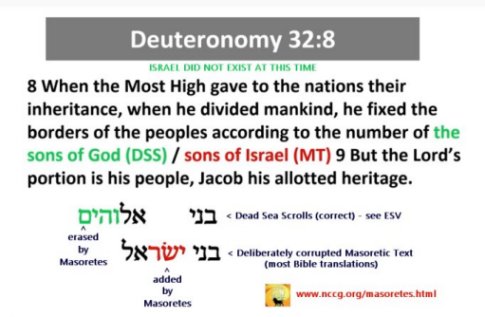
- Jeremiah 10 verses 6 and 7 have been added in the Masoretic;
- Psalm 96:10 “Say among the nations, YHWH reigns from the wood” omitted.
- Isaiah 19:18 “city of righteousness” changed to the “city of the sun” or in some versions “the city of destruction”;
- The Masoretic scribes purposely and willfully rearranged the original chapter order in the prophetic Book of Daniel, so that the chapters make no sense chronologically;
- Isaiah 61:1 “recovery of sight to the blind.” has been omitted;
- In Psalm 40:6 “a body you have prepared for me” was replaced by “you opened my ears”;
- Deuteronomy 32:43 “Let all the messengers of Elohim worship him” was omitted;
- Genesis 4:8 “Let us go into the field” was omitted;
- Deuteronomy 32:43 Moses’ song is shortened;
- Isaiah 53 contains 10 spelling differences, 4 stylistic changes and 3 missing letters for light in verse 11, for a total of 17 differences; and
- Isaiah 7:14 “Virgin” has been replaced by “young woman”;
- Exodus 12:40 “in Egypt and Canaan” has been replaced by “in Egypt”, making it appear that the children of Israel were in Egypt for 430 instead of 215 years;
- Genesis 11:12-22 “When Arphaxad had lived 135 years”, “When Shelah had lived 130 years”, “When Eber had lived 134 years”, “When Peleg had lived 130 years”, “When Reu had lived 132 years” and “When Serug had lived 130 years” have been replaced by “When Arphaxad had lived 35 years”, “When Shelah had lived 30 years”, “When Eber had lived 34 years”, “When Peleg had lived 30 years”, “When Reu had lived 32 years” and “When Serug had lived 30 years”, completely upsetting the chronologies of the patriarchs by six centuries. A careful analysis of the Masoretic chronology reveals why it so substanially differs from the older Greek Septuagint (LXX) - the Masoretes have reset the original dates in order to give the date of the rededication of the second temple (celebrated by the unbiblical, false Hanukkah festival of the Pharisee sect) an auspicious prophetic number, viz. 4000:
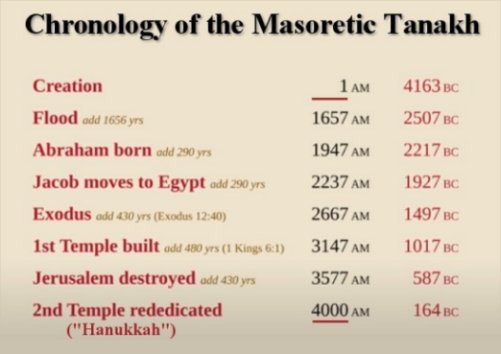 (for a detailed breakdown, click here)
(for a detailed breakdown, click here)
Isaiah 49:17 “builders” has been replaced by “children”;
Hosea 14:2 “fruit of our lips” has been replaced by “calves/bulls of our lips” (cp.Hebrews 13:15);
In the meantime, it needs to be stated that most Western Bible translations whose Tanakh's (Old Testaments) are based on the corrupt 'Masoretic Text', so-called, are more than adequate to preach the Besorah (Gospel) of Salvation to the lost and to teach the Torah lifestyle mandated of the Redeemed. Where our work on the Masoretes will be of the greatest use will be in removing the excuses of the sceptics and in strengthening the testimony of the faithful.
(25 August 2017 | Last updated 8 August 2020)
|


